Transformation in the Singapore Public Service: Emerging Stronger from the Pandemic
ETHOS Issue 22, June 2021

Introduction
The Singapore Public Service is familiar with the experience of massive and disruptive change, of which the ongoing COVID-19 pandemic is but the latest manifestation. When Singapore attained self-governance in 1959, and then independence in 1965, the Public Service had to localise and reorient itself—from its roots as part of the colonial administration—towards nation-building. It had to quickly adjust to take on all the functions of a sovereign state, doing whatever it took to evolve into a bureaucracy that could survive. These early experiences in disruptive change set the foundation for a public service that would seek constant improvement amidst shifts in global and local contexts.
Constantly building and improving on what was done before, each past phase of transformation has been in the core pursuit of sustainable growth and cohesive social development. Each shift has been anchored by an ethos of public service that seeks to understand the fears, concerns and aspirations of Singaporeans, strives to constantly do better with our people and for our people, and invests time and effort to pre-empt tomorrow’s challenges.1
These principles echo lessons gathered over 56 years of transformation efforts in
the Singapore Public Service, in seeking to remain relevant to the citizens it serves:
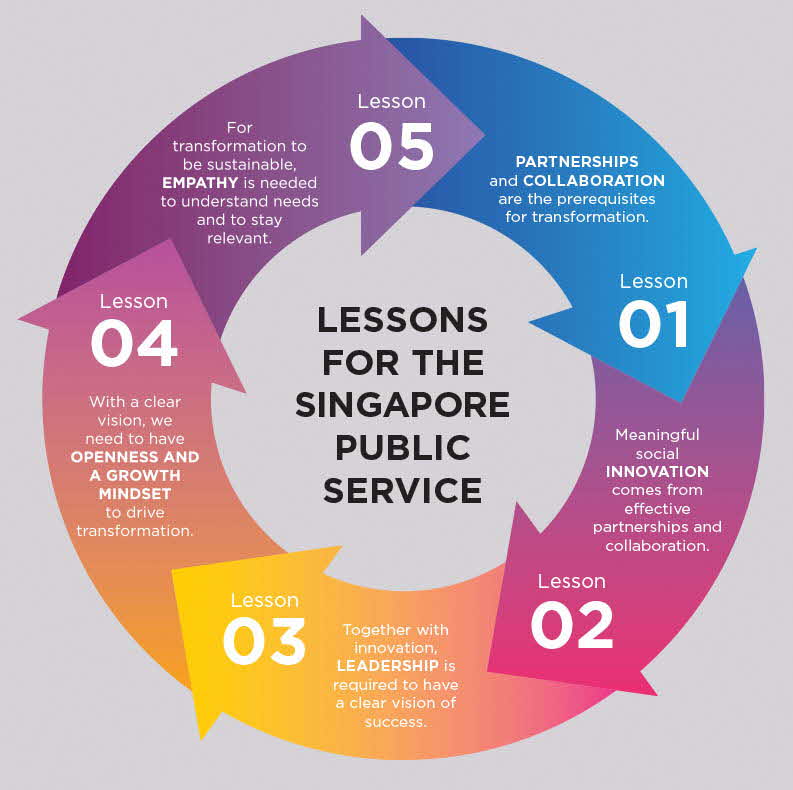
While COVID-19 has brought tremendous disruption to the global landscape, this article outlines how the same hardearned lessons continue to ground Singapore’s response to the crisis as the Public Service works to support and bring Singaporeans as a nation through this challenging period of transformation, and other disruptive challenges the future may hold.
Lesson 1: Partnerships and Collaboration are the Prerequisities for Transformation
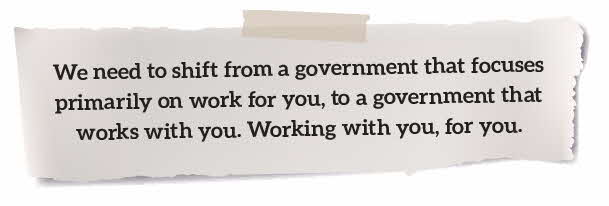
– Heng Swee Keat, Deputy Prime Minister2
Over the decades, the Public Service has learned important and sometimes painful lessons about the need to engage citizens as partners in sensemaking and solutioning for Singapore’s future. While engagement in the 1960s through to the 1980s was characterised by telling citizens about the pros and cons of policies and the way forward for Singapore, a shift to a more consulting style emerged in the 1990s through to the 2000s.
Since the 2010s, as transformation in the Public Service shifted towards “do it together (with citizens)”, the tone of citizen engagement correspondingly shifted from consulting to co-creating, reflecting a greater “partnership between those who govern and those who are governed”.3 This new stance is exemplified by Our Singapore Conversation (OSC)—a series of conversations which took place from 2011 to 2013 over various platforms and involved some 46,000 participants from multiple sectors.4 Designed to be more inclusive and open than prior engagement efforts, OSC expanded the shared space between citizens and government, helping to build the mutual trust needed for further partnerships and collaboration.5
Likewise, the COVID-19-prompted Emerging Stronger Conversations (ESC)6 initiated in 2020 aims to increase community partnerships and expand common spaces in which the Government and citizens can work together to contribute towards the designing and implementation of policies in complex times. The ESC serves as a platform where citizens can share their stories and suggest potential actions and solutions targeted at improving Singapore in a post-COVID era.
Partnerships are critical for converting conviction into action. As issues become more complex, the solution is not to grow the public sector, but to grow and leverage partnerships with people—citizens, corporations, not-for-profits and public officers—synthesising collective efforts in co-authoring Singapore’s future. The role of the Public Service is to bring together all perspectives to facilitate sense-making, cultivating new and better ways of understanding a situation, how it will unfold and what we can all do about it.7
As issues become more complex, the solution is not to grow the public sector, but to grow and leverage partnerships with people.
Lesson 2: Meaningful Social Innovation Comes from Effective Partnerships and Collaboration
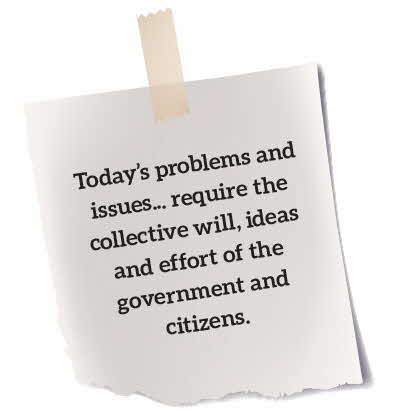
– Dawn Yip, Coordinating Director for
SG Together,
Ministry of Culture, Community and Youth (Partnerships Project Office)8
To build a trusted, thriving and innovative public sector, the Public Service must engage with citizens in more sophisticated ways. “Partnership is also a form of continuous innovation”,9 and public officers will find that partnerships can offer greater access to a wider range of ideas, perspectives and expertise from across Singapore’s society.
Building on lessons from the OSC, the SG Together movement was launched by Deputy Prime Minister Heng Swee Keat in 2019 to purposefully develop systems, structures and people that nurture long-term relationships within and among public agencies, stakeholders and citizens.10 Such longer-term relationships will facilitate even more effective partnerships and collaboration.
SG Together will complement the ideas and connections arising from the ESC initiative. It will also align with efforts and recommendations from the Emerging Stronger Taskforce (EST), announced in April 2020. These efforts will bring together public, private and people (3P) sectors to ensure that economic and social development occur hand-in- hand as Singapore works through the COVID-19 crisis and its impacts.
To ensure that these conversations lead to action, the EST has set up the Singapore Together Alliances for Action and the Singapore Together Action Networks to draw ideas from different sectors and turn them into real-life solutions for Singaporeans.11
Lesson 3: Together with Innovation, Leadership Is Required To Have a Clear Vision of Success
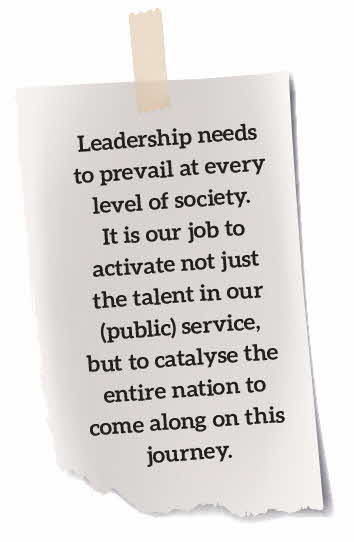
– Chan Chun Sing, Minister-in-charge of the Public Service
and then-Minister for Trade and Industry12
The context in which leadership is practised matters. Where it was considered good leadership to closely direct the Public Service’s early experiences of transformation, today’s leaders must be able to share a clear and inspiring vision of success across all levels of the system. This vision holds the potential to enable and empower people to reimagine the future they want and can achieve.13 Such a shared vision is key to developing a sense of common purpose, ownership and motivation. Over time, as this “ownership quotient”14 increases, working in partnership can become instinctive.
This applies beyond the public sector. For example, with a clear vision “to make every senior a volunteer”, the volunteer organisation RSVP Singapore (RSVP) leads and initiates people-private-public partnerships to engage seniors to serve the community. This affords participating seniors a sense of ownership, allowing them to become a positive force in the community. Over the years, RSVP has engaged about 2,500 volunteers and served more than 200,000 beneficiaries. This was done even during the COVID-19 pandemic, with RSVP leading virtual platforms to conduct virtual outreach and virtual volunteering.
Leadership must also help their people connect all the small pieces to the whole, to enable them to “think big” and convene the efforts of all public officers so they act as a whole to fulfil whole-of-government (WOG) outcomes. Leaders do this as a part of sense-giving by looking at issues from a higher vantage point and providing others with a sense of meaning or different ways of seeing.15 For instance, in the protracted battle against COVID-19, the Multi-Ministry Taskforce (MTF) has consistently reminded Singaporeans to stay vigilant and adhere to safe management measures even as the nation moved into later phases of reopening. In coordinating and managing the WOG pandemic response, the MTF maintained laser-sharp focus on two objectives—early detection and ring-fencing to prevent the transmission and formation of large clusters. This clarity of aim helped responding agencies cut through the “noise” of (mis)information.16
Leaders must be able to manage change effectively, as well as rally support and involvement from public sector staff as well as different stakeholder groups.
This aspect of leadership was underlined at the launch of the EST. In his keynote address, Mr Heng emphasised that the Government is responsible for “facilitating and enabling” the partnerships between it and the private sector, unions, workers and institutes of higher learning, to be able to move quickly as a “whole ecosystem” in order to seize opportunities.17 For instance, the effective public-private partnerships among companies such as Veredus Laboratories, the Agency for Science, Technology and Research (A*STAR), Duke-NUS Medical School and the like, greatly sped up the development of a range of diagnostic kits for detection, contact tracing and containment efforts.18
To enable effective innovation in the Public Service, “mobilisation and movement” characterises the new operating paradigm. Leaders must be able to manage change effectively, as well as rally support and involvement from public sector staff as well as different stakeholder groups. At the same time, they need to be agile and ensure that stakeholders continue to keep the big picture in mind as circumstances change. Singapore’s response to the COVID-19 pandemic is a good example of this. When the virus was still surrounded by uncertainty, the MTF was clear in their focus of stopping the spread of the virus and also ensuring that jobs were protected. This led to the quick introduction of clear social distancing measures, as well as clear policies and support measures.
Lesson 4: With A Clear Vision, We Need To Have Openness and a Growth Mindset To Drive Transformation
Even with a clear vision, the Singapore
Public Service must operate with
openness and a growth mindset in order
to drive transformation. The public sector
must tap on Singaporeans’ passion
and expertise19so that it can continue
to evolve its DNA for improvement. It
must continue to seek opportunities
to grow to become the best it can be,
and then even better—as a system,
and as individual public officers who
make the system work.20
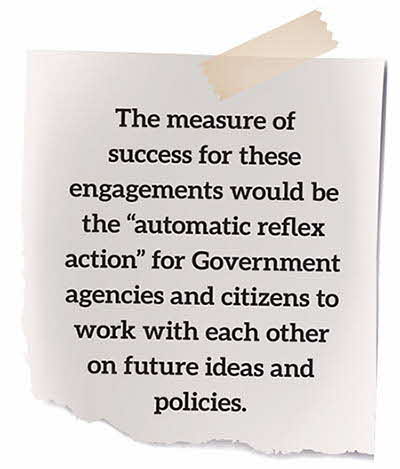
– Indranee Rajah, Second Minister for Finance
and Second Minister for National Development21
Adopting a growth and open mindset is not only about strengthening the Public Service, but also about empowering the people sector. While the social service sector has made much progress, particularly in the areas of governance and public accountability, a lack of coordination among organisations and volunteers has led to situations where different beneficiary groups have been either over-served or underserved. This imbalance has been made more evident by the COVID-19 crisis.
By adopting an open and collaborative stance, the SG Cares Office has pushed for more sustainable and effective solutions by partnering the people sector to solve such issues. Since each social service agency is most familiar with the issues in “their town”, the SG Cares Office has identified these agencies as Volunteer Centres in each town to promote awareness, galvanise participation, develop volunteer communities and offer regular and impactful volunteer opportunities. This approach offers a much more effective way of connecting volunteer efforts with beneficiaries’ needs.
The value of Volunteer Centres was demonstrated during the COVID-19 Circuit Breaker period between April and June 2020, in which many vulnerable groups were affected by the enforced physical and social isolation. During this period, Volunteer Centres stepped forward to gather needs and worked with partners to coordinate efforts and provide essential goods to the vulnerable such as face masks, hand sanitisers, food items and exercise bands.22 Such efforts have continued even as Singapore moved into later phases of safe reopening.
Adopting a growth and open mindset is not only about strengthening the Public Service, but also about empowering the people sector.
Lesson 5: For Transformation To Be Sustainable, Empathy Is Needed To Understand Needs and To Stay Relevant

– Indranee Rajah, Second Minister for Finance
and Second Minister for National Development23
For transformation to be effective and sustainable, the Public Service must stay connected with the circumstances, needs and sentiments of citizens. On top of understanding the people’s perspectives, the Singapore Public Service must be able to engage citizens about their concerns in a safe and constructive space. For instance, the ESC has indicated that, since the COVID-19 outbreak, Singaporeans have been most concerned about issues pertaining to social support, jobs and economy, education and training, digitalisation and technology, and engagement and partnership (between government and people).24
Beyond the broad labels, the Public Service must be able to appreciate the more nuanced dimensions of citizens’ aspirations, concerns and fears. These include (1) maintaining the public’s trust that the Government will not leave them behind in the pursuit of economic development, (2) giving assurance that the Government will continue to support citizens as they work hard towards a better life for themselves and their children, (3) involving the public as partners in the creation of Singapore’s future, and (4) understanding and having empathy for the concerns of stakeholders, including those who may disagree on particular issues.
A group that the Singapore Public Service must quickly learn to empathise and partner with is the youth—the generation that has the greatest stake in the future. Purpose-driven and willing to contribute,25 our youth did not choose to remain bystanders during the COVID-19 period: instead, they took action individually and collectively to provide assistance and support to fellow Singaporeans who needed a leg-up in coping with the circumstances brought about by the pandemic. Whether it was delivering food to families who could not queue up for their usual packages (e.g., delivering meals to 500 families for Ramadan), sewing reusable masks for those who could not procure them (particularly prior to the Government’s free mask distribution exercise), leading efforts through non-profits (e.g., Engineering Good’s Computers Against COVID), or even starting their own businesses (e.g., Beng Who Cooks)26—youths from all walks of life invested themselves in improving the conditions of fellow Singaporeans even as they grappled with their own challenges during the pandemic. This is an encouraging sign for Singapore’s future. The Public Service must find constructive ways of tapping on the energies, ideas and passions of this new generation—within and beyond the public sector—through active engagement and collaboration.
A group that the Singapore Public Service must quickly learn to empathise and partner with is the youth—the generation that has the greatest stake in the future.
Conclusion: Emerging Stronger from COVID-19
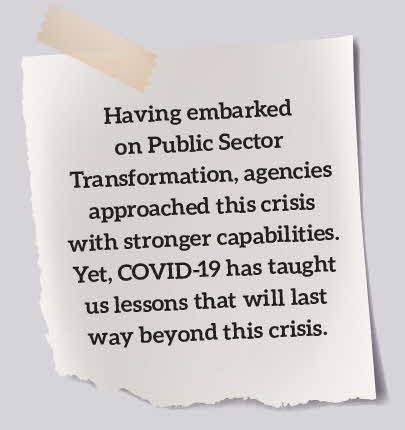
– Heng Swee Keat, Deputy Prime Minister27
The five lessons discussed above have served Singapore well in past phases of change, and continue to stand us in good stead in the disruptive wake of the COVID-19 pandemic.
While the new normal brought about by COVID-19 may be experienced as demanding and disruptive, we need to remember that transformation is also natural and a necessary part of innovation and growth. In this spirit, Singapore cannot just aim to cope with COVID-19. We need to emerge stronger from this pandemic by tapping on the opportunities that COVID-19 has presented.
First, we can become a stronger society by quickening the pace of transformation through technology and innovation. COVID-19 has accelerated digitalisation in the 3P sectors, from conducting meetings virtually to providing services online. To combat COVID-19, we have also built up digital solutions such as TraceTogether. Singapore’s response to the crisis highlights the potential for making better use of data collection and greater integration of operations and technology.
Second, we need to continue being citizen-centric and business-centric in the way that we design and implement policies. COVID-19 has highlighted the importance of an agile, integrated Public Service. To manage and stabilise the spread of COVID-19, many public agencies worked together to enforce safe-distancing measures, distribute face masks and hand sanitisers, and provide aid to the vulnerable. This would not have been possible without a WOG approach. We need to lock in the mentality of working as One Public Service so that we can serve the public holistically.
Third, we must persist in building social resilience and unity among Singaporeans. Singapore could not have contained COVID-19 if everyone had not adhered to safe management measures. Many individuals and businesses also went the extra mile to help the vulnerable. This is the spirit of Singapore Together. As we emerge from this crisis, we must continue to partner citizens in co-creation and provide more opportunities for all to care for one another.
NOTES
- Grace Ho, “Chan Chun Sing Stresses Three Traits Public Servants Need for Singapore to Thrive”, The Straits Times, July 20, 2019, accessed August 31, 2020, https://www.straitstimes.com/singapore/chan-stresses-three-traits-public-servants- need-for-spore-to-thrive.
- Heng Swee Keat, “DPM Heng Swee Keat at the ‘Building Our Future Singapore Together’ Dialogue”, Prime Minister’s Office Singapore, June 15, 2019, accessed September 7, 2020, https://www.pmo.gov.sg/Newsroom/DPM-Heng-Swee-Keat-Building-Our-Future-Singapore-Together-Dialogue.
- Lim Seok Hui and Adrian W. J. Kuah, “After Our Singapore Conversation: The Future of Governance”, Ethos 13 (May 2014), accessed August 6, 2020, https://www.csc.gov.sg/articles/after-our-singapore-conversation-the-futures-of-governance.
- Ng Jing Yng, “Our Singapore Conversation Themes identified, Dialogue to Continue”, Today, July 15, 2013, accessed August 26, 2020, https://www.todayonline.com/singapore/themes-identified-spore-conversation-could-continue.
- Yee Lai Fong and Melissa Khoo, “Redefining Engagement: Lessons for the Public Service from Our Singapore Conversation”, Ethos 13 (May 2014), accessed July 17, 2020, https://www.csc.gov.sg/articles/redefining-engagement-lessons-for-the-public-service-from-our-singapore-conversation.
- Yuen Sin, “New Emerging Stronger Conversations Will Allow Government to Hear from S’poreans on COVID-19 Lessons: Heng”, The Straits Times, June 20, 2020, accessed September 7, 2020, https://www.straitstimes.com/politics/new-emerging-stronger-conversations-will-allow-government-to-hear-from-sporeans-on-covid-19.
- Adam Kahane, “Transformation Alliance: Interview with Adam Kahane”, Ethos 13 (May 2014), accessed July 16, 2020, https://www.csc.gov.sg/articles/transformative-alliance-interview-with-adam-kahane.
- “SG Together: Partnering Singaporeans to Build Our Future Singapore”, Challenge, January 24, 2020, accessed September 7, 2020, https:// www.psd.gov.sg/challenge/ideas/deep-dive/singapore-together-partnering-singaporeans-to-build-our-future-singapore.
- Ibid.
- Ibid.
- Yuen Sin, “New SG Together Action Networks to Be Formed to Address Key Issues like Mental Health”, The Straits Times, June 20, 2020, accessed September 7, 2020, https://www.straitstimes.com/politics/new-sg-together-action-networks-to-be-formed-to-address-key-issues-like-mental-health.
- See Note 1.
- J. Jaworski, Synchronicity: The Inner Path of Leadership, 2nd ed. (Berrett-Koehler Publishers, 2011).
- Cindy Co, “Singapore Together Movement Has Seen ‘Good’ Progress: Indranee, Desmond Lee”, Channel News Asia, January 2, 2020, accessed September 7, 2020, https://www.channelnewsasia.com/news/singapore/singapore-together-movement-good-progress-12227914.
- See Note 13.
- Gov.sg, “COVID-19: Keeping Our Guard Up to Avoid a Resurgence of Cases”, July 17, 2020, accessed January 26, 2021, https://www.gov.sg/article/covid-19-keeping-our-guard-up-to-avoid-a-resurgence-of-cases.
- Cindy Co, “Emerging Stronger Taskforce Will Identify Global Risk, Seize Economic Opportunities for Singapore: Desmond Lee”, Channel News Asia, June 23, 2020, accessed September 7, 2020 https://www.channelnewsasia.com/news/singapore/ emerging-stronger-taskforce-covid-19-economy-desmond-lee-12859054.
- EDB Singapore, “Mission Possible: Singapore Players Do Their Part to Combat COVID-19”, April 29, 2020, accessed January 26, 2021, https://www.edb.gov.sg/en/business-insights/insights/mission-possible-singapore-players-do-their-part-to-combat-covid.html.
- See Note 17.
- Prime Minister’s Office Singapore, “Speech by Mr Leo Yip, Head, Civil Service at the 2020 Annual Public Service Leadership Dinner”, January 17, 2020, https://www.psd.gov.sg/press-room/speeches/speech-by-mr-leo-yip--head--civil-service-at-the-2020-annual-public-service-leadership-dinner.
- See Note 14.
- This example was cited by Dr Ang Hak Seng who currently serves as Deputy Secretary (Special Duties) leading the SG Cares Secretariat in the Ministry of Culture, Community and Youth (2017–Present). The SG Cares movement seeks to increase collaboration and partnerships with the people and private sectors to forge a more caring society. More specific examples can be found in the recording of this webinar: see Smart Nation Singapore, “Building a More Caring and Compassionate Society through Tech”, video posted November 25, 2020, accessed December 24, 2020, https://www.youtube.com/watch?v=OSwbDK2uRus.
- See Note 14.
- SG Together, “Factsheet: Singapore Together Emerging Stronger Conversations—Building a Caring, Cohesive and Resilient Singapore Society”, August 15, 2020, accessed September 7, 2020, https://www.singaporetogether.gov. sg/files/Factsheet_Singapore_Together_Emerging_Stronger_Conversations_ Building_a_Caring_Cohesive_and_Resilient_Singapore_Society.pdf.
- This observation was shared by Dr Ang Hak Seng who is an adjunct faculty member in the Singapore University of the Social Sciences and Nanyang Technological University.
- Stories of these youths can be found at https://www.gov.sg, accessed December 14, 2020.
- Speech by Deputy Prime Minister Heng Swee Keat at the Annual Public Service Leadership Ceremony 2020 on December 4, 2020.

